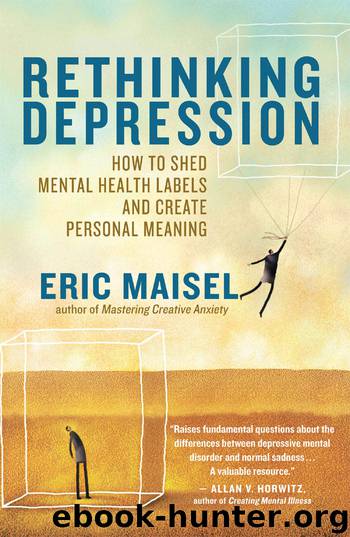Rethinking Depression by Eric Maisel

Author:Eric Maisel
Language: eng
Format: epub
Publisher: New World Library
CHAPTER 13
YOU FOCUS ON MEANING RATHER THAN MOOD
WHAT CAN PREVENT US from using our existential intelligence, making meaning, and living authentically? Our moods. The problem is not only that we may be in a bad mood — it is also that we have gotten into the unfortunate habit of constantly checking in with ourselves to see what mood we’re in. Am I down? Am I very down? Am I down again? Am I down because I’m down? Hamlet pestered himself with the question, “To be or not to be?” and rendered himself limp and indecisive. We pester ourselves with the question, “Am I depressed or am I not depressed?” and fail to realize that this very checking in on our mood is a choice — and an unnecessary and unfortunate one.
What sort of answer would you expect if you checked in on your mood at a moment when you weren’t actively making meaning? Naturally you would be down, since you are checking in with yourself at precisely the wrong moment! You work for an hour on your novel and write a lovely scene. Do you check in on your mood as you’re writing? No. You’ve been making meaning and feeling fine and see no reason to make note of your mood. An hour later, suddenly resistant to writing and uncertain about your novel’s direction, you sit brooding on your sofa and then you decide to check in on your mood. Surprise, surprise! You notice that you’re unhappy. Why check in at exactly that moment?
It is one of the universe’s ironic little jokes that human beings check in with themselves about their mood at exactly the moment when their mood might be at its lowest. Rarely do we check in on our mood when we are having a good time or working hard on something engrossing. At those moments it goes without saying how we are feeling — just fine — and so we don’t bother to announce our good mood to ourselves. We wait until we aren’t occupied and aren’t actively making meaning to check in. How brilliant is that?
Remember that mood is what we are referring to when we talk about “depression.” The word mood only means a state of mind or emotion. But somehow it has been twisted into meaning a state of mind or emotion existing along a happiness-unhappiness continuum. The word as commonly used implies that we are always to some degree happy or unhappy and that we should be monitoring those degrees so that we know when our mood is “disturbed.” But are human beings really always happy or unhappy? Aren’t we often in no particular mood — that is, in a kind of neutral mood? Not only do we take the temperature of our mood far too often — we have created a monster out of the word.
Our current construction of the word mood gives unhappiness more of a central position in our lives than it ought to command. Unhappiness is a reality, but mood is a construct — and a tyrant.
Download
This site does not store any files on its server. We only index and link to content provided by other sites. Please contact the content providers to delete copyright contents if any and email us, we'll remove relevant links or contents immediately.
Should I Stay or Should I Go? by Ramani Durvasula(7628)
Why We Sleep: Unlocking the Power of Sleep and Dreams by Matthew Walker(6668)
Fear by Osho(4706)
Flow by Mihaly Csikszentmihalyi(4660)
Rising Strong by Brene Brown(4421)
Why We Sleep by Matthew Walker(4405)
The Hacking of the American Mind by Robert H. Lustig(4345)
How to Change Your Mind by Michael Pollan(4324)
Too Much and Not the Mood by Durga Chew-Bose(4308)
Lost Connections by Johann Hari(4148)
He's Just Not That Into You by Greg Behrendt & Liz Tuccillo(3864)
Evolve Your Brain by Joe Dispenza(3642)
The Courage to Be Disliked by Ichiro Kishimi & Fumitake Koga(3443)
Crazy Is My Superpower by A.J. Mendez Brooks(3363)
In Cold Blood by Truman Capote(3354)
Resisting Happiness by Matthew Kelly(3328)
What If This Were Enough? by Heather Havrilesky(3291)
The Book of Human Emotions by Tiffany Watt Smith(3275)
Descartes' Error by Antonio Damasio(3253)
